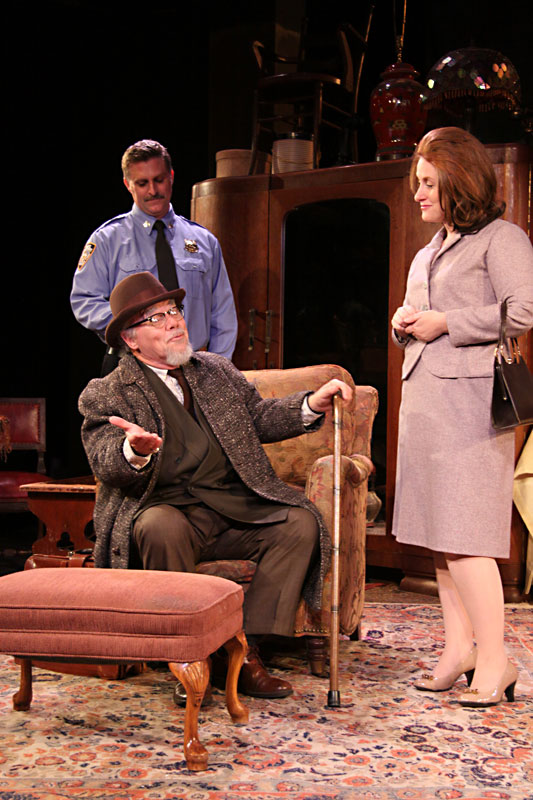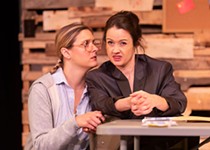Jarrott Productions' The Price
This staging of the Arthur Miller drama keenly appraises the worth of a life
Reviewed by Robert Faires, Fri., Oct. 14, 2016

As life goes on, we tend to accumulate a lot of stuff. Which means that at some point, we have to dispose of that stuff. And if we're unable to do so by simply giving it away or tossing it out, then inevitably we come up hard against the question: What is it worth? If some thing we're disposing of has any meaning for us – whether it's a family heirloom or childhood souvenir or gift from someone near and dear – then we want to believe it has monetary value as well, and we want that monetary value to be comparable to the value of its personal meaning.
Victor Franz gets a keen taste of that in Arthur Miller's The Price, newly mounted by Jarrott Productions. This New York cop is in the attic of his deceased parents' brownstone – destined for the wrecking ball, so everything in it must go – to meet an appraiser and dispose of their stuff. As he's 50 and this is the Sixties (the era cued up by sound designer Craig Brock in preshow tunes by the Vince Guaraldi Trio, Nelson Riddle, Spanky & Our Gang, et al.), his folks' belongings reflect the early decades of the 20th century: a massive wardrobe, a long dining room table, a Victrola and 78s, a harp. (Scene designer Desiderio Roybal provides the agreeable hodgepodge of vintage pieces.) The appraiser – who's even older than most of the items he's pricing – agrees to take all of it, but is the amount of cash he's offering fair? For Vic, the answer comes to factor in not simply the age and condition of each piece but also his own age and condition – all the years he spent caring for his widowed father after the old man lost his business in the Depression and couldn't (or wouldn't) care for himself; the lost career in science that Vic felt compelled to give up to stay with his dad, especially when his brother wouldn't help out; the strain of struggling to make ends meet on a policeman's salary; the need for money as he moves into retirement. How can any appraiser – even one with the name of Solomon – account for all of that in setting a fair price?
What Miller tells us – and this staging shows us – is how money is the yardstick by which we measure the value of our lives. Scott Galbreath's Vic carries himself proudly, but in his face is the tension of what he's sacrificed – in status, in livelihood, in income – and how it's gnawed at him for years. Under his composed demeanor simmer resentment and not a little shame, which bubble up as conversations with his wife Esther get heated over the issue of their meager existence. Amanda Cooley Davis gives a sharp edge to Esther's frustration with their stalled status quo – "I'm tired of being stuck!" she cries – but she gives us much to sympathize with as she spurs her husband into letting go of the past and seizing the future.
Letting go of the past proves much more challenging, though, when Victor's estranged brother unexpectedly appears. Walter has the scientific career that Vic gave up and the prosperity that comes with it, so his mere presence rubs Vic's nose in all that he doesn't have. Before Walter shows up, we're prepped to see him as inconsiderate, condescending, "a selfish bastard" (Esther's words), but Rick Smith eases off the slick superiority and lets us see warmth and generosity in the character, making his efforts to offer his brother an olive branch – and even a job – credible. But Miller has set up the situation, in his trademark fashion, so sins of the past must be confronted and hidden actions brought into the light, and it doesn't take much to see that these brothers in conflict will fare about as well as a couple of Old Testament siblings.
Ignore the playwright's schematic structure, the convenient exits that allow for exchanges between two or three of the four characters, and focus instead on the friction that builds in this attic, so weighted with the past, as these figures brush against one another and what the objects there represent: sacrifices made and not made, lost opportunities, money. It's the difficult, painful debate over what constitutes the value of a life that makes The Price still resonant and timely, and director Fritz Ketchum has orchestrated it to unfold with a heat and speed that feels intensely personal. It provokes questions about how to gauge the worth of what's around you.
The figure in The Price most able to aid you with that is the appraiser, Gregory Solomon. One might call him wise beyond his years – which, for an 89-year-old, is saying something – only his appearance doesn't automatically suggest wisdom. In David R. Jarrott's performance, the shuffle in his step; the tremor in his hand as he pulls a stub of a pencil from his heavy suit coat; the crease in his brow as he sinks from exhaustion, mark Solomon as just another old man. But in the character's pronouncements about his business, his rabbinical questions to Victor, and observations about the attic's contents, Jarrott conveys an uncommon knowledge of the human heart and its workings. Jarrott's mix of amiability and anxiety ground Solomon in our time, but behind them lurks a sage who might be of any age, whose comprehension of the price we pay in living is timeless.
The Price
Trinity Street Theatre, 901 Trinitywww.jarrottproductions.com
Through Oct. 22
Running time: 2 hr., 10 min.












